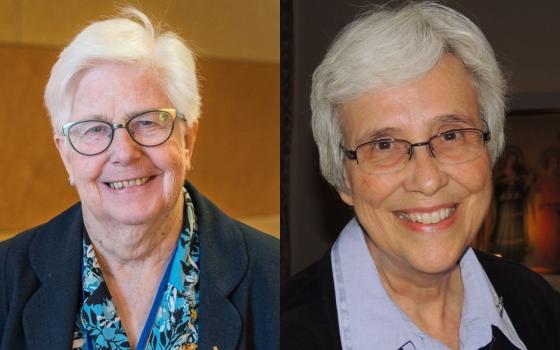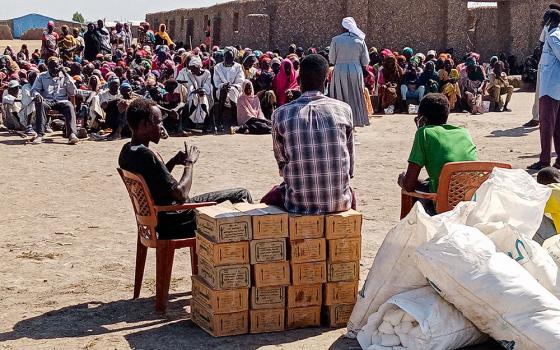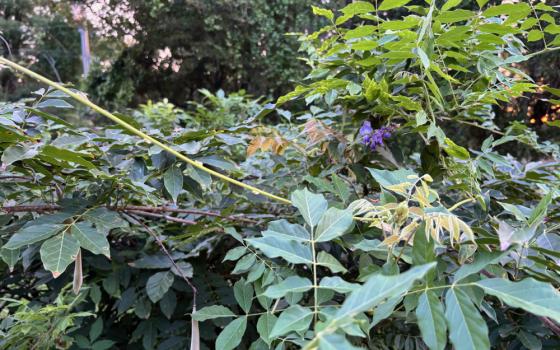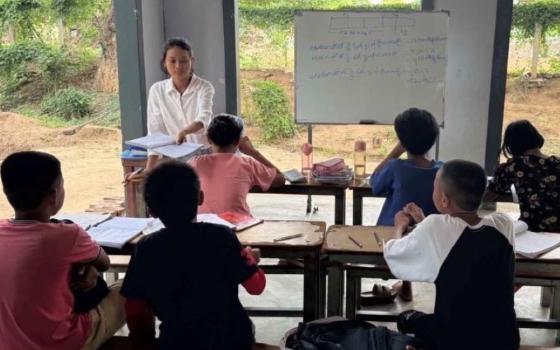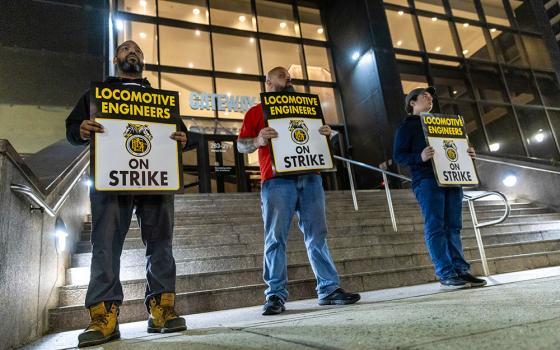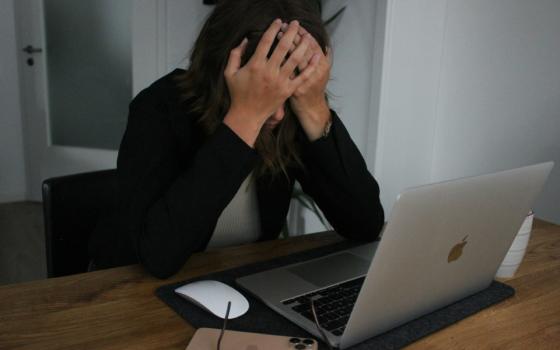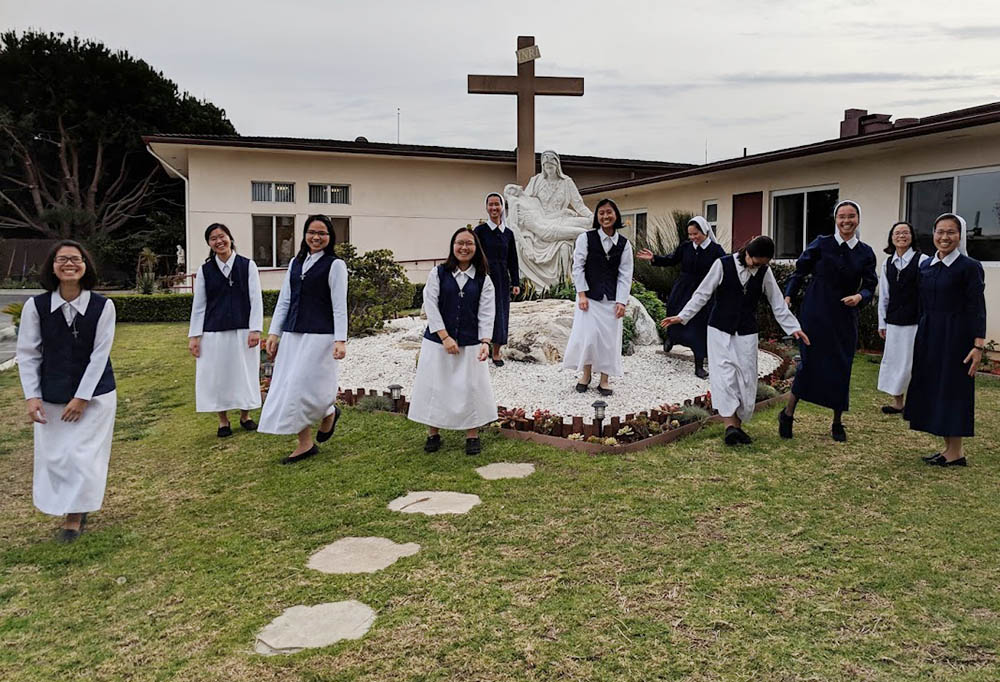
Postulants and novices of the Lovers of the Holy Cross of Los Angeles. A Trinity Washington University/CARA study says that there are more than 4,000 "international sisters" who are currently in the U.S. for formation, studies or ministry. Asia is the largest sending continent at 33%. (Peter Tran)
The recent rise in hate crimes against Asians in the U.S. is sparking concern for Catholic women religious from Asian and Pacific Island countries. Some have experienced verbal abuse, while others have witnessed growing fear in communities they serve. Dismayed that their nationalities have become targets of violence, they are participating in "Stop hate" demonstrations, fostering discussion groups and offering ways to address the issue.
"I feel upset and angry at the violence against Chinese people in New York and other places around the country," said Felician Sr. Dong Hong Marie Zhang, the liaison to the Chinese community for the Archdiocese of Newark, New Jersey.
"I am not afraid for my life," she added, "but the Chinese people to whom I minister told me that they are afraid, especially in public areas."
She had not personally experienced an attack, but some people in the community have told her they "were spat on."
The sister said that during prayer and online meetings in April and May, she brought up hate crime experiences and discussed proactive defenses. One example: Many told her that they lean against a wall of a bus or subway car facing people who might attack them by surprise.
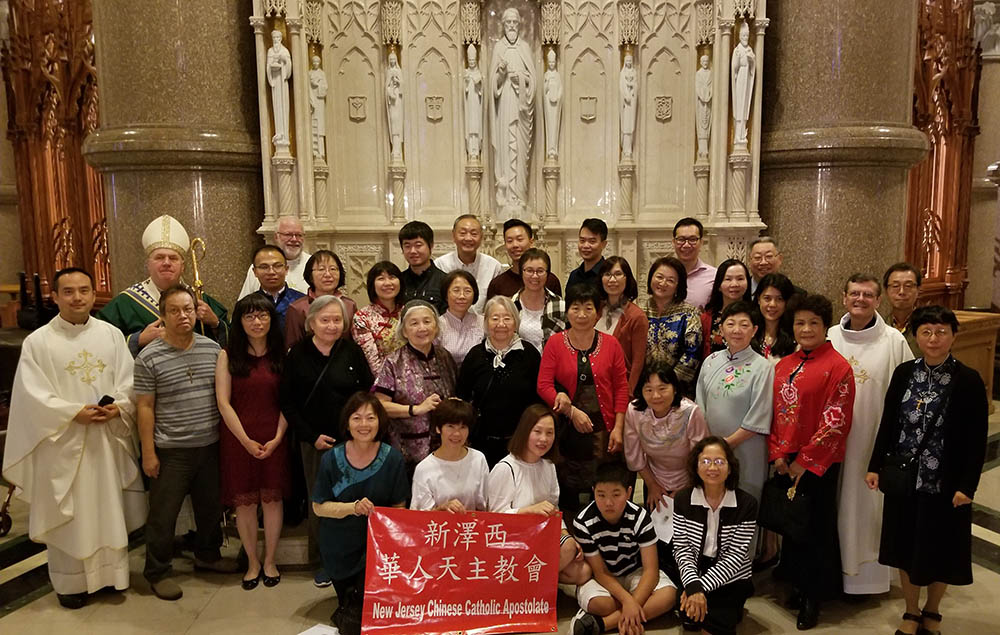
Felician Sr. Dong Hong Marie Zhang, at far right, with the New Jersey Chinese Catholic Apostolate. Newark Cardinal Joseph Tobin is second from left. (Courtesy of Dong Hong Marie Zhang)
Zhang was invited to participate in a White House Initiative on Asian American and Pacific Islanders on May 25 to discuss how the COVID-19 pandemic has impacted the community and the rise in hate crimes and incidents against Asian people.
Global Sisters Report recently spoke with Chinese, Lao, Burmese, Korean, Fijian, Vietnamese and Filipina sisters in New Jersey, Wisconsin, Florida, Pennsylvania, New Mexico, California and Washington, D.C. The sisters talked about the experience of racism in their ministry and inside their respective communities. They offered suggestions on how to deal with the violence directed at Asians, which ranges from verbal harassment to physical attacks and killings.
Hate crimes targeting Asians increased 164% across 16 major U.S. cities in the first quarter of 2021 (223% in New York City alone), compared with the same period of 2020, according to an April 30 report by the Center for the Study of Hate and Extremism at California State University, San Bernardino.
The most shocking incident against Asians was the shooting at massage parlors in Atlanta in March. Eight people, including six women of Asian descent, were killed. The Georgia prosecutor said that the shootings were hate crimes. The accused man pleaded guilty July 27 to four of the killings and was sentenced to life in prison. He still faces the possibility of the death penalty for the cases involving the other victims.
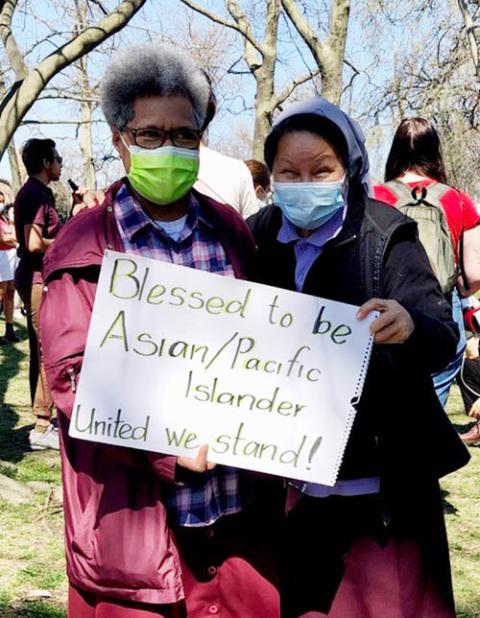
Assumption Srs. Akeneta Lalakobouma, left, and Gertrude Borres join a demonstration against anti-Asian hate in March in Philadelphia. (Courtesy of Gertrude Borres)
Sr. Gertrude Borres of the Religious of the Assumption, said she and Assumption Sr. Akeneta Lalakobouma joined hundreds of demonstrators in downtown Philadelphia in late March to protest against verbal abuse and hate crimes directed toward Asians and Pacific Islanders. It was one of several demonstrations in which she participated.
There is "strong sentiment for peace and harmony among the people," said Borres, who was born in Iloilo, the Philippines, and is the director of the Office for Pastoral Care of Migrants and Refugees of the Philadelphia Archdiocese.
Borres recalled being moved by one woman who came to the rally with her young daughter. The woman told the audience that she spoke for her mother who was afraid for her life when taking public transportation, and for her daughter so that she would grow up without insecurity and hatred.
Borres said she hoped these demonstrations would get the attention of politicians to be careful with their language and to make laws that unify, not divide, society.
Reflecting on violence against Asians, Lalakobouma, a Fijian who teaches English classes for new immigrants and works with women in a knitting program, said, "I feel so bad for those who experienced the hatred and violence against them. I feel terrified for them."
Verbal assaults
When asked about racism in their congregations, parishes and dioceses they serve, Lalakobouma said she never experienced racist comments toward her. However, she recalled an incident about a year ago when — within her international community — she heard one sister remark to another, "Why don't you go back to your country?" She was shocked and later confronted that sister about her comment. She stressed that members of each congregation and diocese need to review their attitude about foreign-born members in their community.
Being the only Chinese person in her congregation in the U.S., Zhang said she made a "lot of cultural adjustment" to fit it with her mostly white religious community. Zhang came to the U.S. in the fall of 2001 to pursue a master's degree in pastoral studies at Loyola University Chicago. It was there that she was introduced to the Felician Sisters.
"In our religious community, parish church and in our diocese, we need to be sensitive toward members of other cultures. Although we are a minority, it does not mean we don't have a voice." Dialogue means being inclusive of all members, she added.
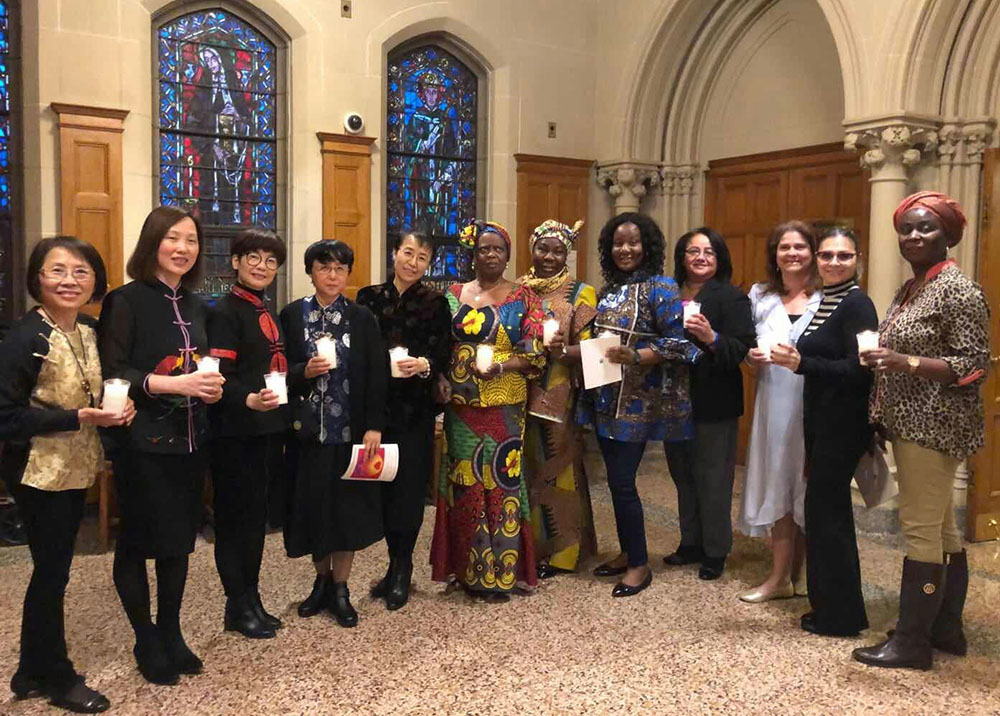
Felician Sr. Dong Hong Marie Zhang, fourth from left, attends at a prayer service with Chinese, Hispanic and African representatives at Newark Archdiocese's cathedral. (Courtesy of Dong Hong Marie Zhang)
With support from the GHR Foundation, researchers from Trinity Washington University and the Center for Applied Research in the Apostolate at Georgetown University in March 2017 issued a study of Catholic sisters who are in the U.S., but were born abroad. The Trinity Washington University/CARA Study: International Sisters in the United States says that there are more than 4,000 "international sisters" who are currently in the U.S. for formation, studies or ministry.
The researchers said their survey found international sisters come from at least 83 countries across six continents. Asia is the largest sending continent with 33%.
Another Filipina sister who is working with the Asian and Pacific Islander communities around the nation said that when she was a "young" junior sister, one sister in her local community acted "condescendingly toward her and seemed to think of herself as racially superior."
The Scalabrinian sister, who asked that her name not be used, added that during the height of the COVID-19 pandemic last year, a customer at a supermarket yelled, "Hey Asian," and smirked at her. In another instance in a cab, the driver asked where she was from. She identified the city where she lives, but the driver kept repeating the question, obviously wanting to know her country of origin.
"As an Asian in this country, by one's color and physical appearance, it seems that one is deemed as a forever, perpetual foreigner, an outsider by many others," added the Missionary Sister of St. Charles Borromeo - Scalabrinians.
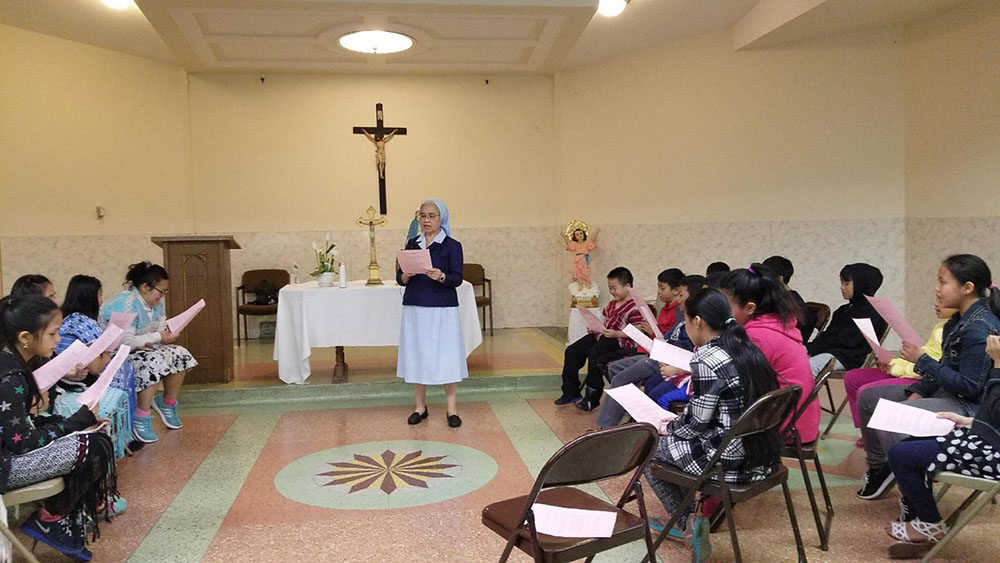
Sr. Alice Thepouthay, a member of the Sisters of Charity of St. Joan Antida and a pastoral associate for the Lao at St. Michael Parish in Milwaukee, with Hmong and Lao children (Courtesy of Alice Thepouthay)
In Milwaukee, Sr. Alice Thepouthay, a member of the Sisters of Charity of St. Joan Antida and a pastoral associate for the Lao at St. Michael Parish, recalled an unpleasant incident of verbal abuse. In May, she took a walk with two shut-in elderly Lao parishioners who'd been cooped up inside the house due to the COVID-19 pandemic. A driver passing by rolled down the window and hurled harsh verbal insults.
One of the elderly asked Thepouthay why the driver was cursing at them. The Lao sister told her two companions to keep walking and pay no attention to him.
The San Bernardino Diocese has been supportive of the Asian and Pacific Islander communities with resources and spiritual formation, pastoral care and social concerns, said Vietnamese Sr. Jennifer Nguyen, a member of Lovers of the Holy Cross of Los Angeles and the director of the diocese's Office of Asian and Pacific Ministry.
"Nonetheless, I feel disheartened when I read the news about the rise of violence and hatred against Asians and Pacific Islanders," she said. "I was shocked at the violence of one person toward another."
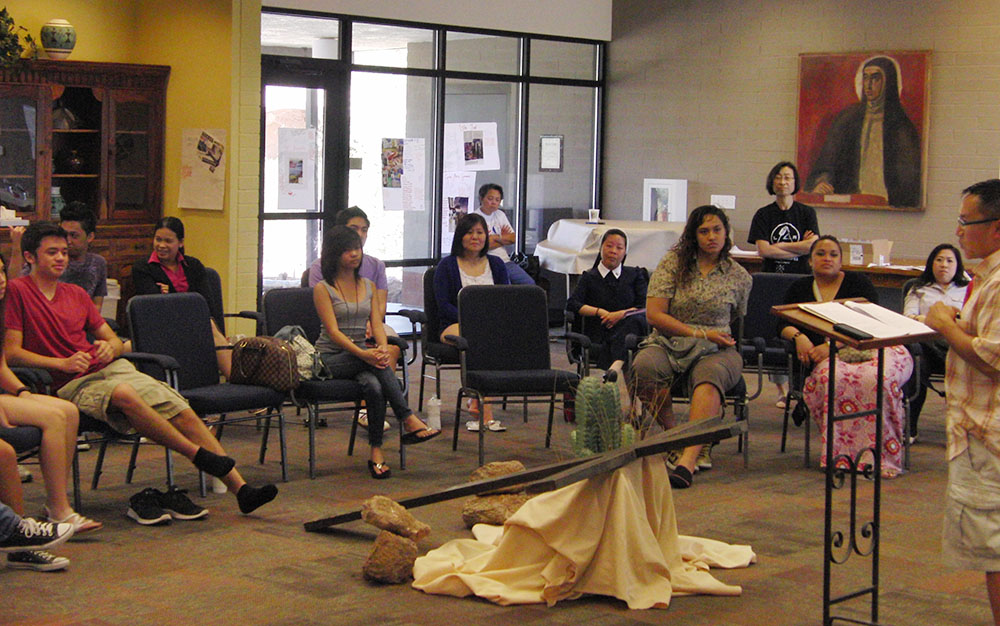
Lovers of the Holy Cross Sr. Jennifer Nguyen (in religious habit), the director of the Office of Asian and Pacific Ministry of the Diocese of San Bernardino, California, joins young adults in a leadership workshop in Tucson, Arizona.* (Peter Tran)
She said she normally wears her habit when leaving the convent as a witness to religious life. In the past, she sometimes might have run a quick errand without her habit. Yet given the rise of anti-Asian incidents in the country, she now wears her habit whenever venturing outside the convent to avoid unnecessary confrontation, believing that people would show respect for a religious sister.
However, she understands that people stereotype one another. "When I was younger, before becoming a sister, sometimes people called me 'Ching Chong,' " she said, recalling her teenage years and her adjustment as a refugee in California.
Regardless, she insisted that she has been "very blessed," and has not felt hatred or dislike in her workplace.
COVID-19 connection
Sr. Sofia Lee, a Korean and a member of the Franciscan Missionary Sisters of Assisi, said that when she came to study in the U.S. some 20 years ago, she noticed that people did not have the patience to listen to her because of her broken English. People felt embarrassed that they could not understand her and did not want to offend her, said Lee, who is director of the Sacred Heart Retreat Center in Gallup, New Mexico.
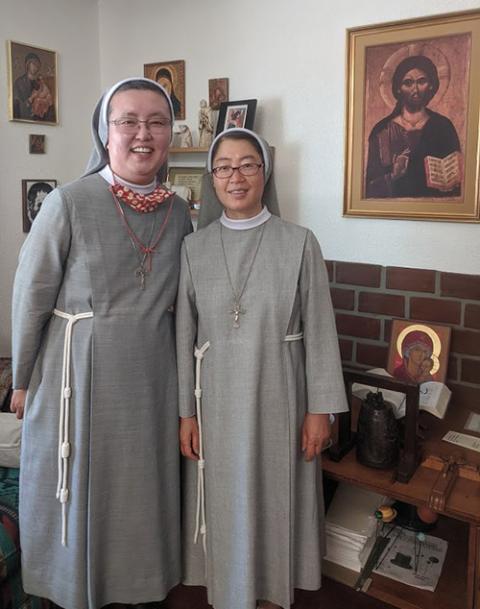
Srs. Sophia Lee, left, and Claudia Kim, both Franciscan Missionary Sisters of Assisi (Peter Tran)
Regarding the recent Asian-hatred incidents, she has tried to understand why people were angry at Asians. Perhaps they may be "in pain" because of the deaths of family members or friends due to COVID-19, or have lost their jobs. When they heard that the virus came from China, she said, they turned their anger and frustration toward Asians.
Another Korean, Sr. Claudia Kim, who lives and works in the same ministry and community with Lee, said racism has always been in this country, but became more visible against Asian people because it was fueled early in the pandemic by then-President Donald Trump, who frequently used racist language to label the COVID-19 virus.
Indeed, most sisters interviewed attributed the rise in recent anti-Asian attacks to the former president, regretting that such reckless "disrespect" to Chinese people through his words came from the highest office in the country.
Zhang, who lived in Wuhan where the coronavirus epidemic first broke out, said that when the former president used the term "Chinese virus" it was like a "green light" to attack Asians in the United States. Yet many Chinese people themselves are victims, thousands have lost their lives, and many more lost family members. "Many Chinese are saying, 'I didn't bring the virus into this country, why did we get attacked? It is not just.' "
The Scalabrinian sister who wished to remain anonymous said she was worried, sad and angry about this hatred for her people. "Asians are often perceived to be hard-working, often trying to keep harmony, avoiding conflict, are obedient and rule-abiding — a 'model minority,' " she said. "This stereotype often cloaks the struggles and difficulties that many Asians experience. Lumping Asians as a monolithic group is a disservice to the diversity in their cultural identity, educational and financial backgrounds, and ways of life. There are those who are successful, but others have failed stories."
Thepouthay, an American citizen, said she is not afraid personally, as she has been serving mostly refugees and new immigrants in her church neighborhood in midtown Milwaukee for more than 35 years. The parish has some 300 white, African American, Spanish, Hmong, Lao, Karen, Chin, Kachin, Puerto Rican and, recently, Tanzanian families.
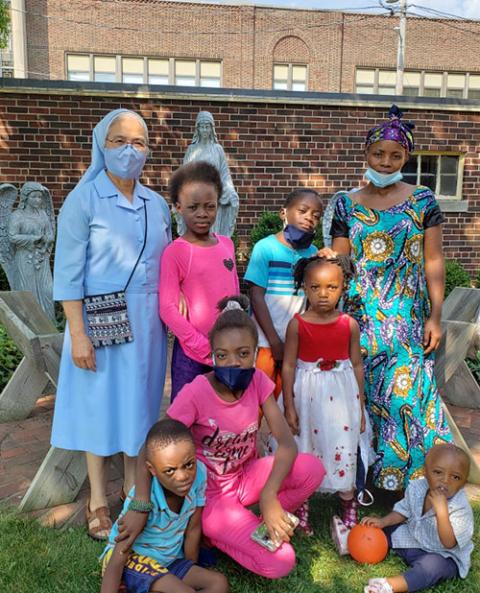
Sr. Alice Thepouthay with Tanzanian members of St. Michael Parish in Milwaukee (Courtesy of Alice Thepouthay)
"We have the same faith and that makes it easy for us to come together," Thepouthay said. "We need to accept one another's differences. To do that we need to create a culture of encounter."
In informal discussions with various groups on how to defend themselves from racist comments, she said that it is important to walk away from any confrontation. "It is better not to be belligerent and confrontational. What if the other person has a gun? The situation might turn out tragically."
Culture of encounter, a call to action
Citing Pope Francis, most sisters concurred on the "culture of encounter" as a way to combat racism.
Borres also emphasized such a culture. "In order to create a culture of encounter, we need to create space for dialogue. In a dialogue, we set up an opportunity to listen to each other, to see the goodness in each other, to build friendship, and to accept each other's differences."
Thepouthay suggested that the encounter needs to start at the parish level, in church and in religious classes for children. Small gestures, such as greeting people, particularly newcomers, and holding educational forums or social gatherings for people to learn about each other's cultures, are some suggestions.
Parish schools and catechism classes "need to teach kids about various cultures, to make friends with those who are different. We need to learn what hatred is about, and how hatred can be manifested in violence," she said.
Among St. Michael's parishioners, "many of us are former refugees and know what it was like to feel welcome," Thepouthay said. "When new refugees or immigrants come in the church, we also can make them feel at home like the way we were welcomed in years past."
Advertisement
Nguyen suggested that in combating racism and violence against Asians and Pacific Islanders, people need to take a step back, observe and listen because everyone has "a story to tell."
People should ask themselves, "What makes me angry toward this group of people? What have they done to me?" Nguyen said. "What do I gain by hurting others? Can anyone choose to be born in one ethnicity, race, color or family? Do we choose to look different from others?"
Srs. Sarah Nant and Rosie Judith of the Sisters of St. Francis Xavier, a diocesan congregation founded in Myanmar, said they were aware of violence against Asians from the news. The Burmese sisters talked about their experience of being new immigrants and about their ministry in the spiritual care department at Ascension St. Vincent's Hospital in Jacksonville, Florida. Their service includes visiting patients, providing spiritual direction and counseling, giving Communion, and preparing daily Mass.
The patients and their families are grateful and friendly, said Nant, who is ethnic Karen. One way to combat fear is to learn about each other, she said. "We do this by sharing meals, sharing the way we live, our customs, sharing the way we treat each other, how we treat and respect elders, and others."
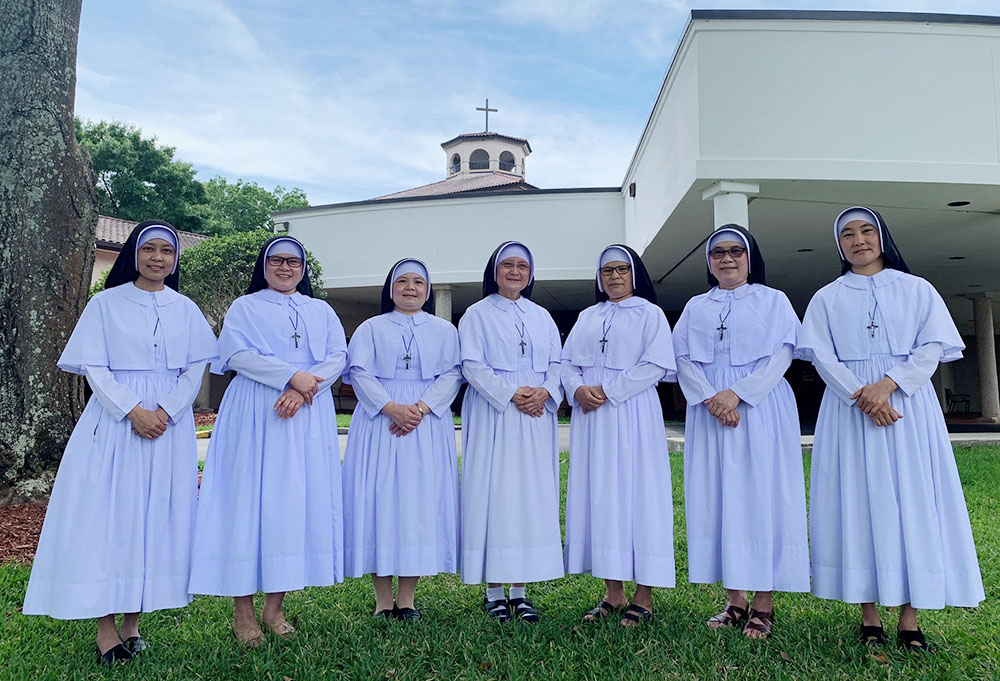
St. Francis Xavier Srs. Sarah Nant (third from left) and Rosie Judith (fourth from left) (Courtesy of Rosie Judith)
Learning about each other is what she did when she arrived from Myanmar in 2012. She was part of a small group of sisters sent by Archbishop Gabriel Thohey Mahn-Gaby of Yangon to enroll in English-language and American culture classes. Judith said the late archbishop had wanted them to learn a new culture and ministries.
The Scalabrinian sister suggested that church with diverse members should invite a cultural expert to conduct sessions on intercultural competence. Such sessions would help "outline cultural features that play in intergroup conflict and how to address those features. Understanding someone who is different from you may lead to opening up more to the other as a first step."
The institutional church needs to do more to build intercultural competence for those in ministry, she insisted. Racial discourse needs to be encouraged in big settings and small groups that include Asians and Pacific Islanders.
She also encouraged Asians and Pacific Islanders to continue to advocate for policies that address racism and violence. "It is time to coalesce as a cohort of Asian women religious — to listen to one another's stories, to be a support to each other, to affirm our gifts to the church and address pastoral challenges in living faith-filled lives in the United States."
*This caption has been edited to correct information about the workshop.

